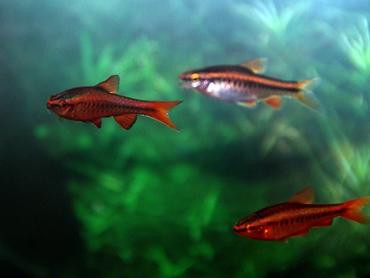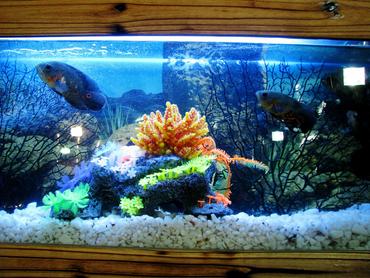COMMON MYTHS ABOUT BETTAS

Updated
Discover five common myths about the beautiful betta freshwater fish.
Betta fish, also known as Siamese fighting fish, are some of the most colorful and elegant species of freshwater fish. These fish have long, flowing fins and brightly colored bodies. The beauty of the betta fish and their ease of care has made this species very popular, particularly among novice aquarium hobbyists. Unfortunately, there are many common misperceptions about this species that leads people to care for them improperly. See if you can answer these questions:
True or false: In nature, bettas live in tiny puddles and actually prefer to live in small spaces?
Answer: False. Bettas are native to Asia, and are found in rice paddies, ponds, and slow moving streams. It is true that betta fish may sometimes be found in puddles as larger bodies of water start to dry out, but this is not their ideal environment. Like most living creatures, they prefer to have plenty of room to move around. If you transfer a betta from a small cup to a big aquarium, they will happily explore every inch of their new tank and you will see their color improve dramatically. There is some debate as to the minimum amount of space that a single betta requires, usually ranging between 1 to 5 gallons. I wouldn’t keep mine in less than two, with five being preferable.
True or false: In nature, bettas live in tiny puddles and actually prefer to live in small spaces?
Answer: False. Bettas are native to Asia, and are found in rice paddies, ponds, and slow moving streams. It is true that betta fish may sometimes be found in puddles as larger bodies of water start to dry out, but this is not their ideal environment. Like most living creatures, they prefer to have plenty of room to move around. If you transfer a betta from a small cup to a big aquarium, they will happily explore every inch of their new tank and you will see their color improve dramatically. There is some debate as to the minimum amount of space that a single betta requires, usually ranging between 1 to 5 gallons. I wouldn’t keep mine in less than two, with five being preferable.

True or false: Bettas can breathe air, therefore, they don’t need a filter?
Answer: This one is a bit more complicated. Bettas possess a labyrinth organ which allows them to breathe air from the surface of their tank. This helps them to survive in low oxygenated waters. So, it is true that bettas can breathe air to some degree, and in fact NEED to breathe air from the surface of their tank in order to survive. But this does not mean that your betta does not need a filter. We must make a distinction between surviving and thriving. Just because your betta is surviving in two cups of water with no heater or filter, does not mean that he is thriving. Bettas are very hardy fish who can survive in poor conditions much longer than most other fish species, but it is inhumane to keep them in such a stressful environment.
Here is another consideration: because of the betta’s long, flowing fins, they do not do well in the strong currents that some filters create. This is especially a risk in smaller tanks where it is more difficult to escape from the current. Under-gravel or sponge filters work very well in these set-ups. It is also important to remember that bettas are tropical fish and unless you keep your home at a constant 80 degrees, he will need a heater. It is generally unsafe to heat less than five gallons of water—another argument for giving your betta more room to roam.
True or False: Male bettas will fight to the death if put in the same tank?
Answer: This one is true. Male bettas are very aggressive with their own species and should never be housed with another betta, male OR female. They are called Siamese Fighting Fish for a reason! In fact, putting a male betta in a tank with any other fish is a bit risky. They can be aggressive towards other fish, especially anything resembling another betta. On the other hand, they have a tendency to get picked on by fast moving and/or nippy fish.
Unfortunately, their beautiful, long fins slow them down and make them an easy target. Some people manage to keep a male betta in a community tank successfully, but I’m not willing to take a risk on mine. My boys each get half of a ten gallon tank all to themselves and they are very content. Tank dividers are available at most pet stores if you want to turn a ten gallon tank into two fives, keeping one male betta in each half. I’ve found this set-up to be ideal. Female bettas are another story. They are relatively peaceful with one another and can usually be integrated into a peaceful community tank. Just make sure they have plenty of space and lots of hiding places.

True or False: Betta fish prefer to live in cold water so they don’t need a heater?
Answer: There are several things wrong with this statement. For one thing, betta fish come from a very warm natural environment so it makes no sense that they would prefer cold water. The ideal temperature range for betta fish is between 72°F and 82°F. Unless you keep your house very warm, you will probably need to heat your betta tank to keep it within this temperature range. Referring back to the myth regarding tank size, you will remember that it is unsafe to use an aquarium heater in a tank smaller than 5 gallons. This being the case, you’ll have to keep your betta fish in a large enough tank that you can heat it safely. Aquarium heaters come in a wide range of different sizes, so be sure to choose one that matches your tank appropriately.
True or False: Live foods and frozen foods are too rich for betta fish – they only need pellets?
Answer: The best staple diet for betta fish is betta pellets – these are specially formulated to provide for the basic nutritional needs of betta fish. Betta fish only need a few pellets per day – overfeeding will just lead to a decline in water quality which can be very bad for your fish. There is no truth to the idea that live foods and frozen foods are too rich for betta fish. All species of aquarium fish require a varied but balanced diet in order to thrive and this is true for the betta fish. You need to be careful, however, about how much food you give your fish. If you offer your betta fish live or frozen foods one day, skip the pellets. Plan to offer your betta fish a variety of foods, keeping the pellets as his staple diet and supplementing them with other foods several times a week.
Bettas are one of my favorite fish species. There are several different tail types in many different colors, making it hard to choose just one. I've been pleasantly surprised with my female bettas, who tend to look dull in the small, dirty cups they are typically kept in at the pet store. Once they are in a better environment, they brighten right up, easily rivaling the males in terms of color. Bettas are beautiful, hardy, and easy to care for. When kept properly, they can provide years of enjoyment.
Bettas are one of my favorite fish species. There are several different tail types in many different colors, making it hard to choose just one. I've been pleasantly surprised with my female bettas, who tend to look dull in the small, dirty cups they are typically kept in at the pet store. Once they are in a better environment, they brighten right up, easily rivaling the males in terms of color. Bettas are beautiful, hardy, and easy to care for. When kept properly, they can provide years of enjoyment.
comments powered by Disqus






































































































































